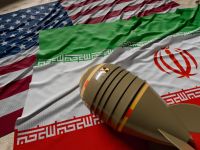With growth inching up and joblessness falling, things are looking better now for Jordan than they have for the past few years. This has mainly to do with the price of oil and improvements in the regional economy, and not with peace with Israel. In one way though, peace seems to have yielded a dividend, in the form of qualifying industrial zone (QIZ) exports. Jordan's QIZs were launched in 1998 when the Al Hassan industrial estate in the north of the country received QIZ designation. New QIZs have since then being established in the south, and private ones in the centre, east of Amman.
QIZ came out of an amendment to the US-Israel Free Trade agreement (FTA). The model offers duty-and quota-free access to the US for products manufactured by 'qualifying' enterprises located in enclaves designated by the United States trade representative.
Products meeting certain criteria can 'qualify.' These include a 35 percent minimum content rule, 11.7 percent of which must be of Jordanian origin and 7-8 percent from Israel; the remainder to reach the 35 percent requirement can be from US, Jordanian, Israeli, or West Bank and Gaza sources.
The QIZ idea is attracting strong attention from US, Israeli, South Asian, Far Eastern and other investors. The Al Hassan facility includes several companies that are already producing for the US market. Dozens of other firms have signed contracts to operate there, and around twenty are already in the process of establishing factories.
The potential for QIZs to create new jobs is a major attraction for Jordan. The factories already in production have directly produced about 6,000 new jobs for Jordanians. Typically, areas where QIZs have been set up are without other major fast- growing sources of employment; increased jobs in such parts of Jordan are additionally useful in helping to curb rural-urban migration and ease pressure on cities.
The heaviest QIZ investment so far is in manufacturing clothing or luggage. In 1999, about $2.4 million of QIZ products, mainly luggage were exported. Exports of similar products in 1998 - pre-QIZ - were only $380,000. This year, $1.8 million worth of such products have been exported in the January-July period; at an annual rate, that would yield luggage exports of over $3 million. The figures represent a large increase on the country's previous capacity in this product, as well as in relation to Jordanian exports to the US in general. This amounts to the introduction of a new export industry into the country, which, though not a higher-tech activity, does involve some transfer of technology to Jordan.
In the first seven months of 2000, QIZ exports were close to $4.7 million, or at an annual rate of about $8 million. Apart from the luggage, the remaining $2.9 million was in clothing. In 1999, the country's total exports of clothes were $49.2 million, and exports in the first four months of 2000 were close to $26, equivalent to over $77 million at an annual rate. QIZ exports of garments thus represent a considerable addition to the country's total exports of these goods.
Jordan and the US are negotiating their own FTA, with the two countries committed to finalizing it quickly. Implementation of the FTA will facilitate substantial expansion of Jordanian exports to the US, which have been meager.
Last year however, they rose by over 63 percent and they are strong in 2000, due in part to the growth of QIZs. Exports to the US for the first four months of this year have already quadrupled compared to the same period in 1999.
Though the precise terms of the FTA are still under negotiation, the accord is expected to seek over time to eliminate customs duties and commercial barriers to bilateral trade in US-and Jordanian-origin goods. In a sense, the US-Jordan FTA will make QIZ irrelevant. However, there will be room for the latter, insofar as the FTA calls for the imposition of a 35 percent or similar minimum on the Jordanian content of value- added in order for a product to enter the US duty-free. QIZ mitigates this by allowing inclusion of 7-8 percent Israeli content, among others, with as little as 11.7 percent Jordanian value added. Insofar as a 35 percent level will not be easy to achieve, the easier terms of QIZ will prove more advantageous for Jordanians wishing to sell their products in the US. Against this must be weighed any complications or difficulties political, commercial or otherwise, of QIZ production - but these seem so far to have been limited.
Whatever the political controversy surrounding them because of the inclusion of Israeli value-added in Jordanian products, QIZs have been multiplying in Jordan. This has proven to be a boon to employment. Jordanian officials have been quoted as estimating that by the end of the year 2002 at least 15,000 more jobs will have been created.
As QIZ production continues to expand, the model's employment effect will grow, making a greater impact on the country's problem of creating jobs for a rapidly expanding labor force.
The US-Jordan FTA will eventually overtake QIZ. Free trade with the US will probably have an even stronger impact on employment, creating yet more jobs along the lines of the present QIZs. The effect on the balance of trade however could be negative. Insofar as relieving unemployment might be a higher priority for Jordan or other countries that gain QIZ status than relieving trade deficits, QIZ would be a superior model to adopt than FTA.
Jordan could thus have its cake and eat it by a long phasing-in period for cuts on tariffs imposed on US products to slow the rush of US imports into the Kingdom, while continuing to use QIZ. Given that QIZ's origins lie in US efforts to push relations between Israel and her Arab neighbors forward, such a strategy might be feasible for Jordan as well as for other countries in the region. Egypt seems to be toying with the idea of QIZ; now that it is working in Jordan, could other countries in the region follow? ― ( Jordan Times )
By Riad al Khouri
© 2000 Mena Report (www.menareport.com)







